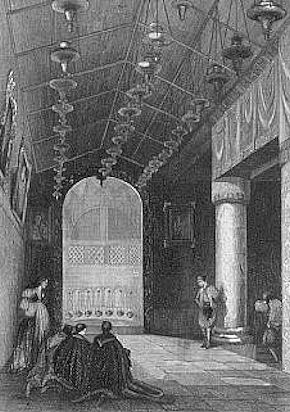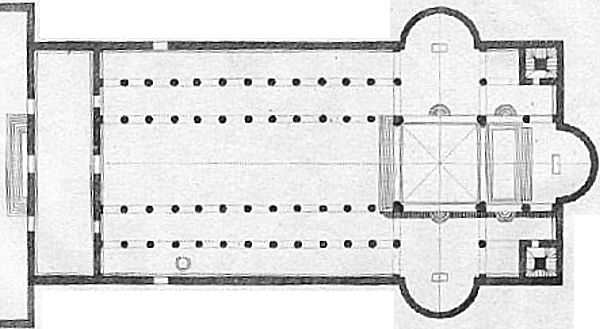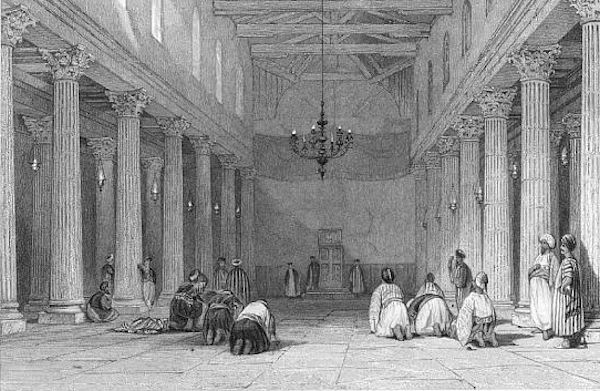| |
On Helena in Eusebius, Vitae Constantini
XLI. Of the Erection of Churches in Bethlehem, and an the Mount of Olives.
In the same country he discovered other places, venerable as being the localities of two sacred caves: and these also he adorned with lavish magnificence. In the one case, he rendered due honor to that which had been the scene of the first manifestation of our Saviour's divine presence, when he submitted to be born in mortal flesh; while in the case of the second cavern he hallowed the remembrance of his ascension to heaven from the mountain top. And while he thus nobly testified his reverence for these places, he at the same time eternized the memory of his mother, who had been the instrument of conferring so valuable a benefit on mankind.
XLII. That the Empress Helena, Constantine's Mother, having visited this Locality for Devotional Purposes, built these Churches.
For she, having resolved to discharge the duties of pious devotion to the God, the King of kings, and feeling it incumbent on her to render thanksgivings with prayers on behalf both of her own son, now so mighty an emperor, and of his sons, her own grandchildren, the divinely favored Caesars, though now advanced m years, yet gifted with no common degree of wisdom, had hastened with youthful alacrity to survey this venerable land; and at the same time to visit the eastern provinces, cities, and people, with a truly imperial solicitude. As soon, then, as she had rendered due reverence to the ground which the Saviour's feet had trodden, according to the prophetic word which says "Let us worship at the place whereon his feet have stood," she immediately bequeathed the fruit of her piety to future generations.
XLIII. A Farther Notice of the Churches at Bethlehem.
For without delay she dedicated two churches to the God whom she adored, one at the grotto which had been the scene of the Saviour's birth; the other on the mount of his ascension. For he who was "God with us" had submitted to be born even in a cave of the earth, and the place of his nativity was called Bethlehem by the Hebrews. Accordingly the pious empress honored with rare memorials the scene of her travail who bore this heavenly child, and beautified the sacred cave with all possible splendor. The emperor himself soon after testified his reverence for the spot by princely offerings, and added to his mother's magnificence by costly presents of silver and gold, and embroidered hangings. And farther, the mother of the emperor raised a stately structure on the Mount of Olives also, in memory of his ascent to heaven who is the Saviour of mankind, erecting a sacred church and temple on the very summit of the mount. And indeed authentic history informs us that in this very cave the Saviour imparted his secret revelations to his disciples. And here also the emperor testified his reverence for the King of kings, by diverse and costly offerings. Thus did Helena Augusta, the pious mother of a pious emperor, erect over the two mystic caverns these two noble and beautiful monuments of devotion, worthy of everlasting remembrance, to the honor of God her Saviour, and as proofs of her holy zeal, receiving from her son the aid of his imperial power. Nor was it long ere this aged woman reaped the due reward of her labors. After passing the whole period of her life, even to declining age, in the greatest prosperity, and exhibiting both in word and deed abundant fruits of obedience to the divine precepts, and having enjoyed in consequence an easy and tranquil existence, with unimpaired powers of body and mind, at length she obtained from God an end befitting her pious course, and a recompense of her good deeds even in this present life.
XLIV. Of Helena's Generosity and Beneficent Acts.
For on the occasion of a circuit which she made of the eastern provinces, in the splendor of imperial authority, she bestowed abundant proofs of her liberality as well on the inhabitants of the several cities collectively, as on individuals who approached her, at the same time that she scattered largesses among the soldiery with a liberal hand. But especially abundant were the gifts she bestowed on the naked and unprotected poor. To some she gave money, to others an ample supply of clothing: she liberated some from imprisonment, or from the bitter servitude of the mines; others she delivered from unjust oppression, and others again, she restored from exile.
XLV. Helena's Pious Conduct in the Churches.
While, however, her character derived luster from such deeds as I have described, she was far from neglecting personal piety toward God. She might be seen continually frequenting his Church, while at the same time she adorned the houses of prayer with splendid offerings, not overlooking the churches of the smallest cities. In short, this admirable woman was to be seen, in simple and modest attire, mingling with the crowd of worshipers, and testifying her devotion to God by a uniform course of pious conduct.
XLVI. How she made her Will, and died at the Age of Eighty Years.
And when at length at the close of a long life, she was called to inherit a happier lot, having arrived at the eightieth year of her age, and being very near the time of her departure, she prepared and executed her last will in favor of her only son, the emperor and sole monarch of the world, and her grandchildren, the Caesars his sons, to whom severally she bequeathed whatever property she possessed in any part of the world. Having thus made her will, this thrice blessed woman died in the presence of her illustrious son, who was in attendance at her side, caring for her and held her hands: so that, to those who rightly discerned the truth, the thrice blessed one seemed not to die, but to experience a real change and transition from an earthly to a heavenly existence, since her soul, remoulded as it were into an incorruptible and angelic essence, was received up into her Saviour's presence.
XLVII. How Constantine buried his Mother, and how he honored her during her Life.
Her body, too, was honored with special tokens of respect, being escorted on its way to the imperial city by a vast train of guards, and there deposited in a royal tomb. Such were the last days of our emperor's mother, a person worthy of being had in perpetual remembrance, both for her own practical piety, and because she had given birth to so extraordinary and admirable an offspring. And well may his character be styled blessed, for his filial piety as well as on other grounds. He rendered her through his influence so devout a worshiper of God, (though she had not previously been such,) that she seemed to have been instructed from the first by the Saviour of mankind: and besides this, he had honored her so fully with imperial dignities, that in every province, and in the very ranks of the soldiery, she was spoken of under the titles of Augusta and empress, and her likeness was impressed on golden coins. He had even granted her authority over the imperial treasures, to use and dispense them according to her own will and discretion in every case for this enviable distinction also she received at the hands of her son. Hence it is that among the qualities which shed a luster on his memory, we may rightly include that surpassing degree of filial affection whereby he rendered full obedience to the Divine precepts which enjoin due honor from children to their parents. In this manner, then, the emperor executed in Palestine the noble works I have above described: and indeed in every province he raised new churches on a far more imposing scale than those which had existed before his time.
Eusebius, Vitae Constantini (book III, chaps 41-47).
1999.04.01 Holy Thursday
a recollection of the day's events.1
My day began with an early morning Internet search of St. Agnes. I specifically wanted to locate a previously found Internet reference that attributed the original (early Christian) building of the St. Agnese basilica in Rome to Constantina, Constantine the Great's daughter. I found the St. Agnes-Constanti(n)a reference, however, during the search process I also accidentally found St. Helena, the mother of Constantine and the grandmother of Constantina. My "discovery" of Helena occurred while reading The Catholic Encyclopedia's online entry on Constantine, where there is a hyperlink to St. Helena. Seeing that Constantine's mother is a proclaimed saint naturally sparked my curiosity. The St. Helena hyperlink connects to The Catholic Encyclopedia's online entry on St. Helena herself, and it was there that I found out that it was not Constantina who was behind all the early Christian church building but rather Helena: Tradition links her name with the building of Christian churches in the cities of the West, where the imperial court resided, notably at Rome and Trier, and there is no reason for rejecting this tradition, for we know positively through Eusebius that Helena erected churches on the hallowed spots of Palestine. Despite her advanced age she undertook a journey to Palestine when Constantine, through his victory over Licinius, had become sole master of the Roman Empire, subsequently, therefore, to the year 324. It was in Palestine, as we learn from Eusebius, that she had resolved to bring to God, the King of kings, the homage and tribute of her devotion. She lavished on that land her bounties and good deeds, she "explored it with remarkable discernment", and "visited it with the care and solicitude of the emperor himself". Then, when she "had shown due veneration to the footsteps of the Saviour", she had two churches erected for the worship of God: one was raised in Bethlehem near the Grotto of the Nativity, the other on the Mount of the Ascension, near Jerusalem. Suddenly, and most unexpectedly, my (re)search turned from St. Agnes and Constantina towards St. Helena. Admittedly, I did not immediately comprehend that Helena was indeed that "builder" of the first Christian churches for which I searched, yet, within an hour of further research, I realized that Helena may well be the first master architect of Christianity.
|


